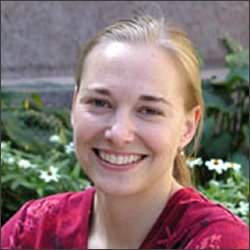Kari A. Segraves

Kari A. Segraves
Professor
CONTACT
Biology
438 Life Sciences Complex
Email: ksegrave@syr.edu
Office: 315.443.4899
Degrees
- NSF Postdoctoral fellow, University of Idaho (2003-2005)
- Ph.D., Vanderbilt University (2003)
- M.S., Washington State University (1998)
Social/Academic Links
Courses Taught
- Bio 405: Introduction to Field Biology Lab
- Bio 448: Evolutionary Medicine
Coevolution, mutualism, evolution of plant-insect interactions.
Understanding biodiversity requires more than identifying the number of species on earth. We must also elucidate how species interactions govern the dynamics of communities, ecosystems, and species diversity. My lab uses a broad combination of approaches including experimental ecology, field observations, molecular phylogenetics, and population genetics to understand the role that interspecific interactions play in creating diversity.
- Glennon KL, Ritchie ME, Segraves KA (2014) Diploid and polyploid plants often share climatic conditions. Ecology Letters 17:574-582.
- Althoff DM, Segraves KA, Johnson MT (2014) Testing for coevolutionary diversification: linking pattern with process. Trends in Ecology and Evolution 29:82-89.
- Althoff DM, Xiao W, Sumoski S, Segraves KA (2013) Florivore impacts on plant reproductive success and pollinator mortality in an obligate pollination mutualism. Oecologia 173:1345-1354.
- Godsoe W, Larson MA, Glennon KL, Segraves KA (2013) Polyploidization in Heuchera cylindrica (Saxifragaceae) did not result in a shift in climatic requirements. American Journal of Botany 100:496-508.
- Conrad AO, Segraves KA (2013) Mycorrhizal colonization of Palafoxia feayi (Asteraceae) in a pyrogenic ecosystem. Mycorrhiza 23:243-249.
(Nov. 15, 2022)
Kari Segraves is serving as a program director of the NSF’s Population and Community Ecology Cluster.
(April 5, 2021)
A&S biologist contributes to paper on the feasibility of using 3D printed insects in mating studies.
(Oct. 15, 2020)
A&S biologists' study on the persistence of mutualisms is published in the prestigious journal "Science."
(April 26, 2017)
Biology professors awarded $710,000 to study mutualistic yeast communities
(July 19, 2016)
Biology Professor Kari Segraves Shines as Model for Faculty Mentorship
